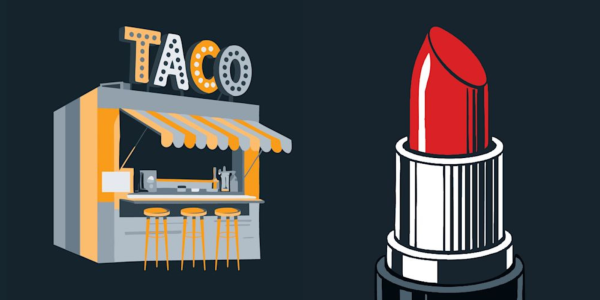What can tacos or tubes of lipstick teach us about history and culture? Ignacio Sánchez Prado and Eileen G’Sell explore the surprising answers in new editions of the popular book series about the secret lives of everyday objects.
Ignacio Sánchez Prado knew he had to write about tacos — he just wasn’t sure how.

Sánchez Prado, the Jarvis Thurston and Mona Van Duyn Professor in the Humanities, is a serial collector and developer of book ideas. At any given time, he has several concepts taking shape in his head or on the page based on his multifaceted interests in film, literature, and culture.
“Writing one book at a time would drive me crazy,” he said.
Among his stable of potential books, the taco kept reemerging as the perfect subject. A quintessential export from his native Mexico, the taco is a supremely adaptable social food, effortlessly crossing borders and culinary traditions. Sánchez Prado himself has sampled tacos in places as far-flung as Denmark and South Korea. Most importantly, the taco is the perfect Trojan horse for sneaking in the bigger sociological questions that fascinate the professor of Spanish, Latin American studies, and film and media studies.
“It ended up being the kind of topic that seduces me: overlooked, understudied, full of counterintuitive facts, and wrapped up in deep economic, social, and cultural histories,” Sánchez Prado said.
Sánchez Prado’s taco project eventually found its perfect match with “Object Lessons,” the Bloomsbury-published series of short books on the unseen histories of everyday objects. Since 2015, “Object Lessons” has published more than 100 books, usually around 150 pages each, with every volume presenting a deep dive into the history and cultural background of one everyday object. These subjects could be tangible (like microphones and refrigerators), digital (passwords, stock photos, and hashtags), or even conceptual (silence). The series officially arrived at WashU when co-editors Ian Bogost, the Barbara and David Thomas Distinguished Professor, and Christopher Schaberg, WashU’s director of public scholarship, joined the university in 2021 and 2023, respectively.

Now, Sánchez Prado will become the first WashU faculty member to publish an “Object Lessons” book with “Taco,” slated for early October. Teaching professor Eileen G’Sell also has a book, “Lipstick,” on deck for early February 2026.
The two books mark a closer integration of “Object Lessons” into the work of the Program in Public Scholarship, an Arts & Sciences Strategic Plan signature initiative whose leadership team features Schaberg, Bogost, and Adia Harvey Wingfield. The program will move to the Office of the Provost in the fall, expanding its scope to include scholars from all schools and departments.

“With Ian Bogost and I now housed at WashU, we have the chance to consider book pitches directly from our expert scholars on campus,” Schaberg said. “In addition, starting in 2026, ‘Object Lessons’ will become a lab experience for WashU English majors in the publishing specialization. Students will get to work hands-on with pitches, proposals, and manuscripts in progress.”
G’Sell has followed “Object Lessons” for the past several years, which helped inform her pitch on the cross-cultural potency of lipstick.
“I was immediately smitten with their sleek design and rigorous-yet-accessible tone,” G’Sell said of the book series. Some of the volumes she used for inspiration include “Doll,” “Glitter,” and “Magazine.” “Each of these books incorporates research and personal narrative in creative ways. As a culture critic, I rarely loop in my own personal story, so it was helpful to see how others have done so while retaining a quasi-scholarly approach.”
G’Sell estimates that 15 to 20 percent of “Lipstick” is rooted in her personal experiences, radiating outward to explore the cultural shockwaves these small plastic tubes have caused over the decades.

“Even though I grew up in a conservative Midwestern household, lipstick was something I had permission to experiment with,” G’Sell said. “I was — and still am — enamored of its talismanic, transformative properties.”
For his book on the taco, Sánchez Prado also aimed to blend personal details with broader historical and cultural explorations. He took inspiration from the Latin American literary genre “crónica,” which allowed him to move fluidly between different storytelling techniques. “It is a hybrid genre that allows for memoir, essay, research, and narrative to coexist in the same space,” he said.
Sánchez Prado rattled off several “Object Lessons” titles that he enjoyed as a reader (“Potato,” “Wine,” “Hotel,” “Gin,” “Recipe,” “Coffee”). But, just as importantly, he said the series serves as an essential bridge between accessible, entertaining writing and academic rigor, using simple objects as gateways to bigger, scholarly ideas. In the current political climate, that balance matters more than ever, he said.
“When ‘Object Lessons’ started 10 years ago, this kind of writing wasn’t really valued by universities,” Sánchez Prado said. “But now, as the humanities have come to reckon with the many misconceptions the public has about them, the public humanities are one of the fastest-growing ways to really advocate for our fields in the public sphere. Having a university of WashU’s caliber host the series and support a Program in Public Scholarship indicates that our institution is leading its peers in this new pathway in which public-facing writing may become as valuable as scholarly writing in the humanities and social sciences.”





